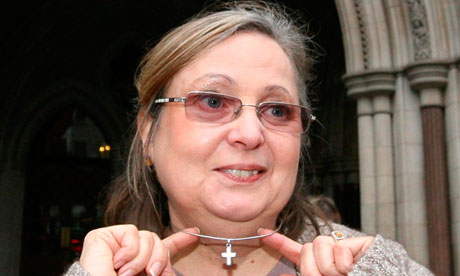
The European Court of Human Rights has just given its verdict on four cases, all involving Christians:
Some newspapers have led their stories on the first case—that of a BA worker who was fired for refusing to remove her cross. But it’s the third and fourth cases that really matter (in fact, you could argue that since wearing a cross is not an issue of faithful obedience to God, Christians should remove them if asked, in order to obey God in, “as far as it is possible, liv[ing] at peace with everyone”—Romans 12 v 18).
The third and fourth cases are issues of Christian obedience. These were the test cases for whether, in the UK in 2013, Christians could obey the Lord while doing their jobs, as and when that obedience meant they had to refrain from certain parts of those jobs. It’s not as if a registrar couldn’t be very busy officiating at civil weddings between men and women. Or a Relate counselor couldn’t have a full-time job counseling heterosexual, married couples about their sex lives.
This is about what happens when Christian obedience and homosexual “rights” come into conflict. And the courts have decided that the latter wins.
So this is a significant moment. And it should matter to Christians in the rest of Europe—this finding affects everyone in the EU. And it should matter, too, to Christians in the US. For the last 70 years, trends have started in the US and then hit the UK about 15 years ago. But the UK has managed, unfortunately, to reverse that trend, by exporting secularism. In the state’s and society’s relationship to Christianity, the UK is a taste of the US to come.
So how should we react?
First, let’s not be surprised or angry. We don’t live in a Christian country. We live in a post-Christian one. So we shouldn't expect it to reach Christian conclusions or defend Christian freedoms. There’s simply no point in the “This country’s legal code/historic freedoms/democratic principles are based on our Christian heritage”—the (very good) answer is simply: “Well thanks for getting us this far – now we’ve improved things”. We can pray that we’ll remain free to preach the gospel and live lives that honour God (1 Tim 2 v 1-4); but we mustn’t expect that we will. Courts and Christians have never got on particularly well; our Lord never got a good verdict in the court of religion, of Roman might, or of public opinion.
Second, let’s remember to get redemption and sanctification the right way round. If the UK were a country full of people who hadn’t asked Jesus to free them from the eternal consequences of their sins, but who lived very good, moral, “Christian” lives, things would be no better. Living “right” doesn’t save anyone. Jesus does that. Let’s make sure that our conversations and our pulpits hold out the offer of redemption in the Lord Jesus to those who don’t know Him; not demand adherence to a moral code which they don’t want, and which can’t save. Let’s make sure that visitors to our churches don’t hear: “This is how you should live” but “This is how the Lord gives you life”.
And, third, let’s do something really hard. Let’s not shy away from persecution (such as it is). Let’s remember that unlike many brothers and sisters round the world, we “have not yet resisted to the point of shedding [our] blood” (Hebrews 12 v 4).
And Lillian Ladele and Gary McFarlane, you don’t have your jobs anymore, but you have known the privilege of suffering for the sake of Christ; we pray that you, like the apostles, are counting it a privilege, albeit a painful one (Acts 4 v 41).
It looks like many of us will, in various ways, be facing that privilege too, over the coming years. But that’s OK. The Lord Jesus, who knows more about suffering than any of us ever will, because He has taken for us the only suffering that lasts eternally, told us this would happen. And He told us how to view it:
“Do not be afraid of those who kill the body and after that can do no more. But I will show you whom you should fear: Fear him who, after the killing of the body, has power to throw you into hell” (Luke 12 v 4-5). And Jesus took that hell for us. There is nothing to fear.
This is a significant moment in the history of Christianity in the UK. But it is not a defeat. Defeat is falling away from knowing Jesus, not losing a job or even a life. In the end, the Bible nowhere tells us to wear a cross; or to keep our jobs. It does say:
“Be faithful, even to the point of death, and I will give you the crown of life” (Revelation 2 v 10). That’s victory.
Diane